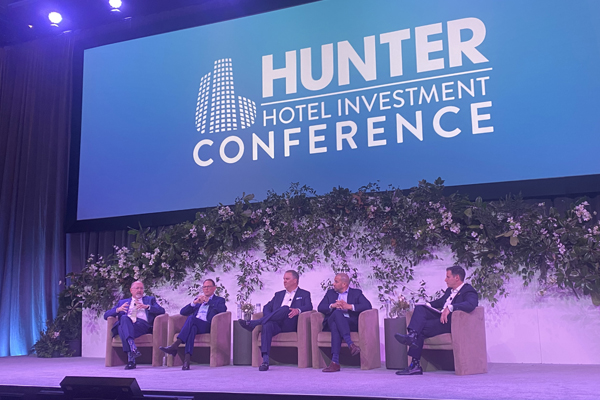ATLANTA — You might have missed it, but according to Kevin Davis, Americas CEO of JLL Hotels & Hospitality Group, the next lodging cycle is already underway and it’s anticipated to be heady on the transactions front. “On the surface, it doesn’t appear like a lot is going on, but there are lots of deals behind the scenes that will be announced,” he said on a panel at the 35th edition of the Hunter Hotel Investment Conference, here at the Marriott Marquis. “Sizable transactions will get done in the third and fourth quarter.”
As one of the largest global brokers of real estate, JLL peer CBRE would know. According to Bill Grice, president of the Americas for CBRE Hotels, the brokerage house is already up 30% on transactions year-over-year and it stands to get better, he said. “There is a velocity of deals coming later this year as bid/ask spreads compress. We are in an asset class that has been an outperformer.”
Davis added that there is also a boom coming in foreign direct investment into U.S. hotels from Europe and the Middle East, which view the U.S. as a safe haven for capital, what he referred to as a “flight to quality.”
Consider New York, according to CoStar data, hotel trades reached $3.3 billion in 2023, an increase of more than 37% over the previous year. As Evan Weiss, COO and principal at LW Hospitality Advisors pointed out: “Thank god we are not in the office space.”
Optimism for an improved transactions market is a factor of many variables currently at play; namely, the state of capital markets and the “will they or won’t they” cut interest rates. Don’t bet on it, according to Teague Hunter, president and CEO of Hunter Hotel Advisors. “Seven percent,” that is the new norm, he said. “We are not going back to 4% money—it’s not happening.”
With loan maturities coming due and a rougher refinance environment, many owners of hotels are having to ask themselves if now is the time to walk away from the table. According to Trepp, across all lender types, $2.81 trillion in loans will come due between 2024 and 2028. In 2023, $541 billion in debt backed by office buildings, hotels, apartments and other types of commercial real estate came due, the highest amount ever for a single year, according to Trepp.
“Deals aren’t easy, but there is a lot of activity,” Hunter said. “There are lots of sellers.”

Another broker, Dan Peek, president and COO of Hodges Ward Elliott, said deal activity is not only growing but also diversifying. He said a vast majority of deals he saw had been sub-$50-million transactions in drive-to-leisure markets. Now, for instance, Peek said he is working on five deals in Washington, D.C., with cities like Chicago and San Francisco stepping back into the spotlight. “There is broader conviction from the equity side,” he said.
Asset orientation has also evolved. Much of the deal and development activity in the course of the past several years has leaned into the midscale and select-service space. JLL’s Davis said that, historically, select service made up around 30% of entire investment. Over the past the past years, that has changed, and has become the predominant asset class for activity. He said that in 2023 select-service hotels made up around 51% of all investment, a function of the asset class becoming more institutionalized.
Debt Drive
Higher interest rates have increased the cost of capital and the cost of debt, but lenders aren’t just sitting passively on the sidelines waiting. “Lenders want to do deals,” said Hunter. “People want to do deals, they just might not like the pricing.”
Added HWE’s Peek, “Things are getting financed, it’s just a bit more expensive.”
Lenders are increasingly looking at hospitality as a well-performing asset class that, though still risky, has shown a resilience born out of the pandemic. “We are seeing significant spread compression in the lending space,” Davis said, adding that on the debt side, there has been a rally in both fixed and floating CMBS, with spreads in the high 100s. “There is more liquidity getting in,” Davis said.
Between the buying and selling of hotels is the operation of the asset itself, with owners more and more focused on the bottom line and profitability generation. The exponential growth in average daily rates that ensued in the post-COVID era were a boon to the top line and gave some cover to an increase in cost lines that were a function of inflation and supply chain challenges. “Can’t do that anymore,” Hunter said, adding that variables like property taxes, insurance and labor were all higher. “Margin compression is a real thing,” he said. “Operations are getting harder and a good operator sets itself from the pack.”
Operators, Peek said, are becoming more sophisticated and doing more with less. He said the impact from technology like AI will heavily impact and help revenue management. At JLL, AI is being used for its predictive capabilities “to see who will be a buyer or a seller,” Davis said.
To a man, panelists agreed that it was a great time to invest in the hotel space, even in the face of geo-political conflict. “It can be a high-risk, high-return business,” Davis said. The talent is in sorting through the noise and identifying the deals that make sense,” he said.
Or, as Grice jokingly said, “Just get with Taylor Swift’s team and find out where she is going next,” adding, in all seriousness, “The smart money is starting to make bets.”
